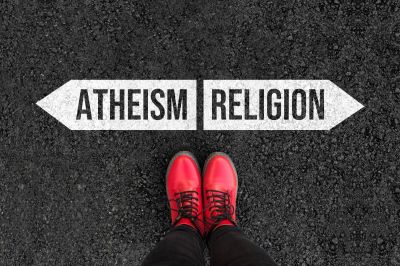How atheists have made me a better Christian

My apologetics and philosophy professor in seminary, Dr. Norman Geisler, had a very unorthodox approach to his devotional reading. He used that time to study atheist writings.
When asked why, he’d say, “Because they keep us honest”.
When I took Geisler’s contemporary philosophy class, we were given a massive binder you could barely get your hand around. In it were the writings of all the top contemporary atheists on the subject of God; not a single Christian writer was included.
Our job was to read through the entire thing and assess the strength of their arguments. It was one of the best classes I ever took at seminary and its impact on me was long-lasting.
You might think, “Why would you fill your head with all that negative God thought vs. studying Scripture, apologetics, and other writings that would build up your faith?” My answer is, 1. We studied all the latter first; 2. As John Stuart Mill said, “He who knows only his own side of the case knows little of that”; 3. It absolutely did strengthen my faith in ways that no other set of knowledge could.
Let me explain how.
The importance of the God question
Before I begin, let me make a distinction between reading and conversing with atheists vs. what I call “hatetheists.” I genuinely like conversing with atheists, and I appreciate some of the well-thought-out objections they bring against Christianity. Although we disagree on theological matters, I’ve found many atheists to be respectful, intelligent, and understanding when it comes to having points of disagreement.
But the hatetheist? Different story. You can read about the distinctions between the two in a post I wrote a couple of years ago.
When it comes to how atheists have boosted my faith, the first thing that stands out to me is how some of them acknowledge the importance of the God question. Sound surprising?
Listen to what Richard Dawkins says: “Now, I think that the hypothesis of theism is the most exciting scientific hypothesis that could possibly hold. The idea that the universe was actually created by a supernatural intelligence is a dramatic, important idea. If it were true, it would completely change everything we know. We'd be living in a totally different universe. Now that's a big thing. I'm sorry, but it's bigger than personal comfort and nice stories and things. The idea that the universe has lurking beneath it an intelligence, a supernatural intelligence that invented the laws of physics, invented mathematics. That is a stupendous idea if it's true. And to me that simply dwarfs all talk of nobility and morality and comfort and that sort of thing.”
He's 100% correct.
Dawkins’s observation is important because it rips to shreds one of the fastest-growing worldviews today, which is apatheism — the “don’t know/don’t care” attitude toward God. Getting this question right is critical and, even though they don’t believe, some atheists acknowledge the weight of the issue and understand it’s worth exploring.
Life without God
Next, I’m impressed with their honesty when it comes to evaluating what life is like without God. And they confess that being without Him isn’t pretty.
For example, take Jean-Paul Sartre and his work Nausea where he describes life as an empty bubble floating on a sea of nothingness. When a person courageously accepts this, Sartre says it makes them sick, hence the title of his book.
Or consider Martin Heidegger who said all human beings are characterized by something he called “Unheimlichkeit” in German, which means a weirdness we all feel; a sensation of being homeless, alienated, and profoundly lonely. In a world without purpose, what else would you expect?
Albert Camus agreed and in his novel The Fall said this: “Beauty is unbearable, drives us to despair, offering us for a minute the glimpse of an eternity that we should like to stretch out over the whole of time … For anyone who is alone without God, without a master, the weight of days is dreadful … For the person who likes to dig into these ideas, they find life is impossible.”
Without God “the weight of days is dreadful.” That’s some hard truth to accept, but absent a Creator who gives us real purpose, he’s right. As Bertrand Russel wrote, “... only on the firm foundation of unyielding despair, can the soul’s habitation henceforth be safely built.”
No absolute morals without God
I’m not sure there’s been another time in history when more people told other people how to morally behave, act, and live. But if God doesn’t exist, that’s a silly exercise because everything devolves into opinion. Without a Creator, there is no absolute moral framework to look to for guidance, which is something various atheists admit.
Frederick Nietzsche said: “You have your way. I have my way. As for the right way, the correct way, and the only way, it does not exist.” Or listen to Dawkins again: “Life has no design, no purpose, no evil and no good, nothing but blind pitiless indifference.”
And yet.
Absolute morals do exist unless you believe that gratuitously torturing babies for fun, racism, rape, and similar acts can be OK given the circumstances.
Atheist philosopher Louise Antony doesn’t think so; she acknowledges: “Any argument against the objective reality of moral values will be based on premises that are less obvious than the existence of objective moral values themselves.” Or hear how far another atheist philosopher, J. L. Mackie, goes on the subject: “We might well argue that objective intrinsically prescriptive features supervenient upon natural ones constitute so odd a cluster of qualities and relations that they are unlikely to have arisen in the ordinary course of events without an all-powerful God to create them.”
I think he’s on to something.
The reason we reject God
Lastly, I appreciate the honesty of some atheists when it comes to why they reject the idea of a Creator. They openly admit it has nothing to do with any intellectual objections, supposed contradictions in Scripture, or the problem of evil.
They just don’t want God to exist.
For example, Thomas Nagel has written: “I want atheism to be true and am made uneasy by the fact that some of the most intelligent and well-informed people I know are religious believers. It isn't just that I don't believe in God and, naturally hope that I'm right in my belief. It's that I hope that there is no God! I don't want there to be a God; I don't want the universe to be like that.”
Christopher Hitchens went so far as to declare he wasn’t an atheist but an “antitheist” because he didn’t like the idea of God: “I am not even an atheist so much as an antitheist … I do not wish, as some sentimental materialists affect to wish, that they were true … I am relieved to think that the whole story is a sinister fairy tale; life would be miserable if what the faithful affirmed was actually true … I cannot imagine anything more horrible or grotesque.”
And then you have Aldous Huxley representing the God-cramps-my-style crowd when he writes: “We objected to the [Christian] morality because it interfered with our sexual freedom.”
I can keep going, but I think you see what I’m driving at. While denying what the Bible says, these atheists affirm exactly what Scripture declares and admit that life is one big swirly without God.
At the end of my contemporary philosophy course with Geisler, I distinctly remember turning the last page in my massive atheist writings binder and thinking to myself, “Is this really the best they have?” Given all my previous training in apologetics and logic (prereqs for the course and important for anyone wanting to wade deep into atheist waters), their arguments not only didn’t make a dent in my faith; they actually strengthened it because they acknowledged many truths and admitted they have no real answers for life’s big questions.
In the end, their stance against God firmly drove home to me what Scripture says: “Human defiance only enhances your glory” (Ps. 76:10, NLT).
Robin Schumacher is an accomplished software executive and Christian apologist who has written many articles, authored and contributed to several Christian books, appeared on nationally syndicated radio programs, and presented at apologetic events. He holds a BS in Business, Master's in Christian apologetics and a Ph.D. in New Testament. His latest book is, A Confident Faith: Winning people to Christ with the apologetics of the Apostle Paul.




























